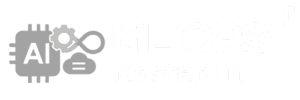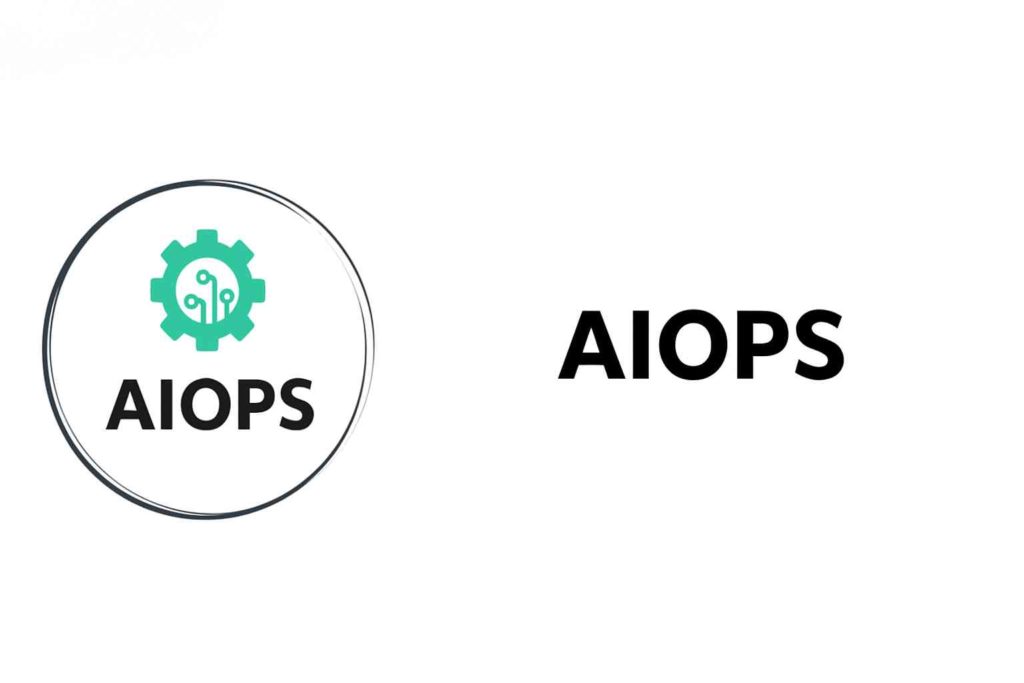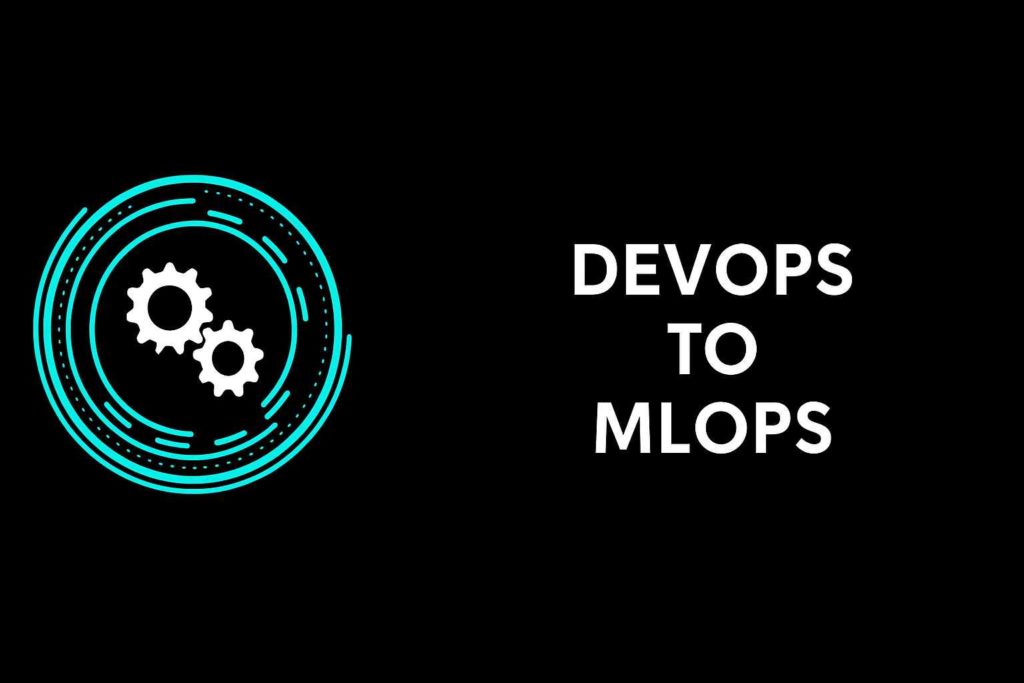MLOPS Training in hyderabad
with
100% Placements & Internships
- Comprehensive Curriculum
- Expert Trainers
- Real-Time Projects
- Certification
MLOPS Course In Hyderabad
Batch Details
| Trainer Name | Mr. Rakesh |
| Trainer Experience | 10+Years |
| Timings | Monday to Friday (Morning and evening) |
| Next Batch Date | 25-DEC-2025 AT 11:00 AM |
| Training Modes | Classroom & Online |
| Call us at | +91 9000360654 |
| Email us at | aimlopsmasters.in@gmail.com |
| For More Details at | For More Demo Details |
MLOPS Institute In Hyderabad
Why choose us?
- Experienced Certified Trainers
- Complete Best MLOps and Cloud Curriculum
- Hands-On Practical Training
- Training with Latest AI MLOPS Tools and Platforms
- Small Batch Size for Personal Attention
- Flexible Batch Timings (Weekday/Weekend)
- Flexible Online MLOps Course and Classroom Options
- MLOps Interview Questions
- Mock Tests & Certification Guidance
- 100% Placement Assistance
- Lifetime LMS Access
- Personalized Student Support
- 20+ MLOps Resume Examples
MLOPS Course In Hyderabad
MLOPS Course Syllbus
Module 1: Introduction to MLOps
- Difference between MLOps, DevOps, DataOps
- Importance of MLOps in AI/ML Projects
- MLOps Lifecycle Overview
- Business Benefits of MLOps
Module 2: Machine Learning Lifecycle & Challenges
- Data Collection and Preprocessing
- Model Training & Validation
- Model Deployment Process
- Common Challenges in ML Lifecycle
- Need for Automation in ML Workflows
Module 3: Data Engineering in MLOps
- Data Ingestion: Batch & Real-Time
- Data Storage: Data Lakes & Warehouses
- Data Validation & Quality Checks
- Feature Engineering Basics
- Feature Stores (Feast, AWS Feature Store)
Module 4: Experiment Tracking & Model Management
- Experiment Tracking Tools (MLflow, W&B)
- Hyperparameter Tuning & Logging
- Model Registry & Version Control
- Dataset Versioning (DVC, LakeFS)
- Metadata Management & Audit Trails
Module 5: CI/CD for Machine Learning
- Introduction to CI/CD in ML
- GitHub Actions, GitLab CI, Jenkins for ML
- Testing ML Pipelines
- Model Packaging & Containerization
- Deployment Strategies (Blue-Green, Canary)
Module 6: Containerization & Orchestration
- Introduction to Docker for ML
- Building ML Docker Images
- Kubernetes Basics for MLOps
- Kubeflow Pipelines Overview
- Scaling ML Models with Kubernetes
Module 7: Model Deployment Strategies
- Batch vs Online Deployment
- Model Serving with Flask & FastAPI
- TensorFlow Serving & TorchServe
- Serverless Deployments (AWS Lambda, GCP Cloud Run)
- Edge & On-Premise Deployment
Module 8: Monitoring & Model Performance
- Importance of Monitoring in MLOps
- Data Drift vs Concept Drift
- Monitoring Tools (Prometheus, Grafana, MLflow)
- Logging & Metrics Collection
- Automated Retraining Pipelines
Module 9: Governance, Security & Compliance
- ML Governance & Policies
- Model Explainability (SHAP, LIME)
- Bias & Fairness in ML Models
- Data Privacy & Security (GDPR, HIPAA)
- Responsible AI Practices
Module 10: Capstone Projects & Case Studies
- Building End-to-End ML Pipeline
- Deploying ML Model on Cloud (AWS/GCP/Azure)
- Real-Time Prediction System with Kafka + ML
- Drift Detection & Monitoring Project
- Final Capstone: Enterprise MLOps System
Module 11: Advanced Data Engineering for MLOps
- Streaming Data with Apache Kafka & Flink
- Real-Time Data Processing Pipelines
- Data Quality SLAs & Incident Playbooks
- Data Lineage & Provenance Tracking
- Handling Imbalanced & Noisy Data
Module 12: Feature Engineering & Feature Stores
- Advanced Feature Engineering Techniques
- Feature Selection & Dimensionality Reduction
- Online vs Offline Feature Engineering
- Feature Store Architecture
- Tools: Feast, Tecton, Databricks FS
Module 13: Model Training Workflows
- Traditional vs Automated Training Workflows
- Distributed Training (Horovod, TensorFlow, PyTorch)
- Transfer Learning in MLOps Pipelines
- AutoML Tools & Frameworks
- Training Optimization for Cost & Speed
Module 14: Hyperparameter Tuning & Optimization
- Manual vs Automated Hyperparameter Search
- Grid Search, Random Search, Bayesian Optimization
- Hyperparameter Tuning in MLflow & W&B
- Parallel & Distributed Tuning
- Best Practices for Reproducible Experiments
Module 15: Model Registry & Version Control
- Importance of Model Registries
- MLflow Model Registry Workflow
- Versioning Models with Git/DVC
- Promotion from Staging to Production
- Rollback & Recovery Strategies
Module 16: Workflow Orchestration
- Airflow Basics for ML Pipelines
- Prefect Workflows for MLOps
- Dagster for Data & ML Orchestration
- Pipeline Scheduling & Triggers
- Orchestration Best Practices
Module 17: ML Pipeline Design
- Designing Modular Pipelines
- DAG (Directed Acyclic Graph) Structures
- Artifact Management in Pipelines
- Reusable Pipeline Components
- Debugging & Logging in Pipelines
Module 18: Continuous Integration for ML
- CI for ML vs Traditional CI
- Testing Data & Model Code
- Linting, Unit Tests & Integration Tests
- GitHub Actions for ML Workflows
- CI Best Practices for ML Teams
Module 19: Continuous Deployment for ML
- CD Concepts in Machine Learning
- Blue-Green Deployment for ML Models
- Canary Deployment in ML Systems
- Shadow Deployment & Traffic Splitting
- Safe Rollouts & Rollbacks
Module 20: Infrastructure as Code for MLOps
- Introduction to IaC
- Terraform for Cloud ML Infrastructure
- Helm Charts & Kubernetes Deployment
- Kustomize for Config Management
- Best Practices in IaC for ML
Module 21: Containerization Best Practices
- Optimizing Docker Images for ML Models
- Multi-Stage Docker Builds
- GPU-Enabled Docker Images
- Security in Docker for ML Workloads
- Container Lifecycle Management
Module 22: Kubernetes for MLOps
- Kubernetes Basics (Pods, Nodes, Services)
- Deploying ML Models on Kubernetes
- K8s Autoscaling for ML Workloads
- StatefulSets & Persistent Volumes for ML Data
- Monitoring Kubernetes ML Deployments
Module 23: Kubeflow for MLOps
- Introduction to Kubeflow
- Building Pipelines with Kubeflow
- Experiment Tracking in Kubeflow
- Hyperparameter Tuning in Kubeflow
- Serving Models with KFServing
Module 24: Model Deployment on Cloud
- Deploying Models on AWS SageMaker
- Deploying Models on Google AI Platform
- Deploying Models on Azure ML
- Containerized Deployment on Cloud Run / AKS / EKS
- Hybrid & Multi-Cloud Deployment
Module 25: Real-Time Model Serving
- REST APIs for Model Serving
- gRPC for Low Latency Serving
- FastAPI for ML Model APIs
- TensorFlow Serving & TorchServe
- Scaling API Endpoints
Module 26: Batch Model Serving
- Introduction to Batch Inference
- ETL + Batch Prediction Pipelines
- Orchestration of Batch Jobs
- Handling Large-Scale Predictions
- Batch Serving Use Cases
Module 27: Serverless ML Deployment
- Introduction to Serverless ML
- AWS Lambda for Model Serving
- Google Cloud Functions for ML
- Azure Functions for ML
- Cost Optimization in Serverless ML
Module 28: Edge & On-Premises Deployment
- Introduction to Edge AI
- Model Optimization for Edge (ONNX, TFLite)
- Deploying Models on IoT Devices
- Hybrid Deployment (Edge + Cloud)
- On-Prem ML Deployment Challenges
Module 29: Model Optimization Techniques
- Quantization & Pruning
- Model Distillation
- ONNX Runtime Optimization
- TensorRT for Inference Acceleration
- Reducing Model Latency & Memory
Module 30: Streaming Inference
- Streaming ML with Apache Kafka
- ML with Apache Flink & Spark Streaming
- Real-Time Event Processing Pipelines
- Sliding Windows for Predictions
- Case Studies in Streaming ML
Module 31: Monitoring ML Systems
- Importance of Monitoring ML Models
- Key Metrics (Accuracy, Latency, Throughput)
- Monitoring Tools (Prometheus, Grafana)
- Logging & Observability Practices
- Real-Time Dashboards for ML Ops
Module 32: Drift Detection & Alerts
- Data Drift vs Concept Drift
- Drift Detection Techniques
- Automating Drift Monitoring
- Alert Systems for Drift
- Tools: Evidently AI, MLflow, Arize
Module 33: Continuous Training
- What is Continuous Training?
- Retraining Triggers & Policies
- Automating Retraining Pipelines
- Validating New Models Before Release
- CT in Cloud Platforms
Module 34: Feedback Loops in MLOps
- Importance of Feedback Loops
- Closing the Loop: Retraining with Feedback
- Human-in-the-Loop Systems
- Active Learning in MLOps
Module 35: Observability in MLOps
- Logging ML Predictions
- Distributed Tracing with OpenTelemetry
- Monitoring Data Quality in Production
- Error Tracking & Debugging Pipelines
- Observability Best Practices
Module 36: Model Governance
- Governance in Enterprise MLOps
- Defining Approval Workflows
- Model Lifecycle Management
- Policy Enforcement for ML Pipelines
- Governance Tools & Frameworks
Module 37: Responsible AI Practices
- Introduction to Responsible AI
- Fairness in ML Models
- Detecting & Mitigating Bias
- Case Studies of Responsible AI
- Future Trends in Ethical AI
Module 38: Explainable AI (XAI)
- Importance of Model Explainability
- SHAP & LIME for Interpretability
- Global vs Local Explainability
- Building Explainability Dashboards
- Industry Use Cases of XAI
Module 39: ML Security
- Threats in ML Systems (Data Poisoning, Model Stealing)
- Adversarial Attacks in ML
- Secure Model Deployment Practices
- Data Privacy & Encryption in MLOps
- Security Testing for ML APIs
Module 40: Compliance in MLOps
- Regulatory Requirements (GDPR, HIPAA, CCPA)
- Data Anonymization & Masking
- Audit Trails for ML Pipelines
- Compliance Reporting
- Tools for Compliance Automation
Module 41: Advanced Tools in MLOps
- MLflow Advanced Features
- Weights & Biases Advanced Tracking
- Data Versioning with DVC
- LakeFS for Data Management
- Experiment Tracking Best Practices
Module 42: Cloud MLOps on AWS
- AWS SageMaker Pipelines
- AWS Feature Store
- Model Monitoring with AWS CloudWatch
- CI/CD with AWS CodePipeline
- Case Study: AWS MLOps Workflow
Module 43: Cloud MLOps on GCP
- GCP Vertex AI Pipelines
- Dataflow for Streaming ML
- Model Deployment with AI Platform
- Monitoring with Stackdriver
- Case Study: GCP MLOps Workflow
Module 44: Cloud MLOps on Azure
- Azure ML Studio Workflows
- Azure Feature Store & Databricks
- CI/CD with Azure DevOps
- Monitoring & Drift Detection on Azure
- Case Study: Azure MLOps Workflow
Module 45: Advanced Orchestration
- Advanced DAG Design
- Conditional Tasks in Pipelines
- Parallelization in Workflows
- Dynamic Pipeline Creation
- Pipeline Observability & Optimization
Module 46: AutoML in MLOps
- What is AutoML?
- AutoML Tools (H2O.ai, AutoKeras, TPOT)
- AutoML with Cloud Platforms
- Integrating AutoML into Pipelines
- Pros & Cons of AutoML in Production
Module 47: Cost Optimization in MLOps
- Cloud Resource Optimization
- Spot Instances for ML Training
- Optimizing GPU & TPU Usage
- Cost Monitoring & Billing Dashboards
- Case Study: Cost-Efficient MLOps
Module 48: Capstone Project 1 – End-to-End Pipeline
- Building a Complete ML Pipeline
- Automating Data → Train → Deploy → Monitor
- Using CI/CD in the Pipeline
- Deploying on Kubernetes or Cloud
- Documenting the Workflow
Module 49: Capstone Project 2 – Drift Monitoring
- Building Drift Detection Pipelines
- Real-Time Dashboards for Drift
- Automated Alerts for Model Failure
- Retraining Workflow Integration
- Final Model Monitoring Report
Module 50: Final Capstone – Enterprise MLOps System
- Combining All Modules into One Project
- Data Engineering + Training + Deployment + Monitoring
- CI/CD + Governance + Security
- Multi-Cloud Deployment with Monitoring
- Presenting End-to-End Enterprise Solution
AIMLOPS Trainer Details
INSTRUCTOR
Mr.Rakesh
Expert & Lead Instructor
10+ Years Experience
About the tutor:
Mr. Rakesh, our AIMLOps Trainer, has more than 10+ years of experience in Artificial Intelligence, Machine Learning, and IT operations. He has worked with leading MNCs and startups in fields like healthcare, e-commerce, and finance, building and deploying AI/ML solutions at scale.
He is an expert in teaching the complete AIMLOps lifecycle, including data preprocessing, model training, deployment, monitoring, and automation with CI/CD pipelines. He also covers modern tools like Docker, Kubernetes, MLflow, TensorFlow, and cloud platforms such as AWS, Azure, and GCP, with real-time use cases.
His training style is focused on hands-on practice, live projects, and industry-based case studies, so learners gain practical skills. Apart from technical teaching, Mr. Rakesh also guides students in resume preparation, certification support, mock interviews, and career planning, making sure they are fully ready for AI MLOps job roles like AI Engineer, MLOps Engineer, and Data Scientist.
Why Join Our MLOPS Institute In Hyderabad
Key Points
- Pipeline Automation
Learn how to automate the complete machine learning workflow, from data preprocessing and training to deployment and monitoring. With CI/CD pipelines, you can achieve faster delivery, reduce manual work, and ensure reliable production workflows.
- Model Tracking
Master the skill of managing multiple models and datasets using MLflow and DVC. You will understand how to version, track, and reproduce experiments, making your ML projects more organized, scalable, and efficient.
- Experiment Management
Organize and compare different experiments in a structured way. Learn how to analyze results, pick the best-performing models, and maintain detailed experiment logs for continuous improvement.
- Monitoring Models
Get trained in monitoring deployed models to detect data drift, performance issues, or reduced accuracy. This ensures your ML systems remain stable and continue to provide business value over time.
- Scalable Deployment
Deploy models at scale using Docker, Kubernetes, and cloud services like AWS, Azure, and GCP. You will gain skills to make models enterprise-ready and capable of handling high workloads.
- Team Collaboration
Understand how Data Scientists, DevOps Engineers, and Developers collaborate in MLOps. Learn teamwork practices that make projects smoother and help deliver AI solutions faster.
- Security & Compliance
Get hands-on knowledge of securing ML pipelines with authentication, role-based access, and compliance measures. Learn how to meet data privacy laws like GDPR while working on AI systems.
- Business Integration
Explore how to connect machine learning models with real business applications in healthcare, e-commerce, and finance, ensuring AI brings measurable impact to organizations.
- Capstone Project
Work on a full end-to-end project where you design, build, deploy, and monitor an ML pipeline. This practical project helps you gain job-ready skills and confidence to work in environments.
What is MLOPS ?
- MLOps is a combination of Machine Learning and DevOps practices that helps organizations build, deploy, and manage ML models in a systematic and automated way. It bridges the gap between data scientists and operations teams, making ML solutions more reliable.
- The main goal of MLOps is to make the ML lifecycle faster, more reliable, and scalable. It reduces manual work, improves accuracy, and ensures models are production-ready for business use. This saves both time and operational costs for companies.
- MLOps covers the full lifecycle of ML projects, including data preprocessing, model training, deployment, monitoring, and continuous improvement. It ensures smooth collaboration between different teams and maintains models even after deployment.
- It makes use of modern tools like Docker, Kubernetes, MLflow, TensorFlow, and cloud services such as AWS, Azure, and GCP. These tools help in automation, scalability, and efficient deployment of ML models across multiple environments.
- With MLOps, businesses can integrate machine learning models directly into their operations. This leads to better decision-making, improved efficiency, and competitive advantage. Industries like healthcare, finance, and e-commerce are adopting MLOps widely for growth.
- Learning MLOps opens doors to high-demand job roles such as MLOps Engineer, AI Engineer, and Data Scientist. It is a future-ready skill that combines knowledge of AI, DevOps, and cloud computing, making professionals stand out in the job market.
Objectives of the MLOPS Training In Hyderabad
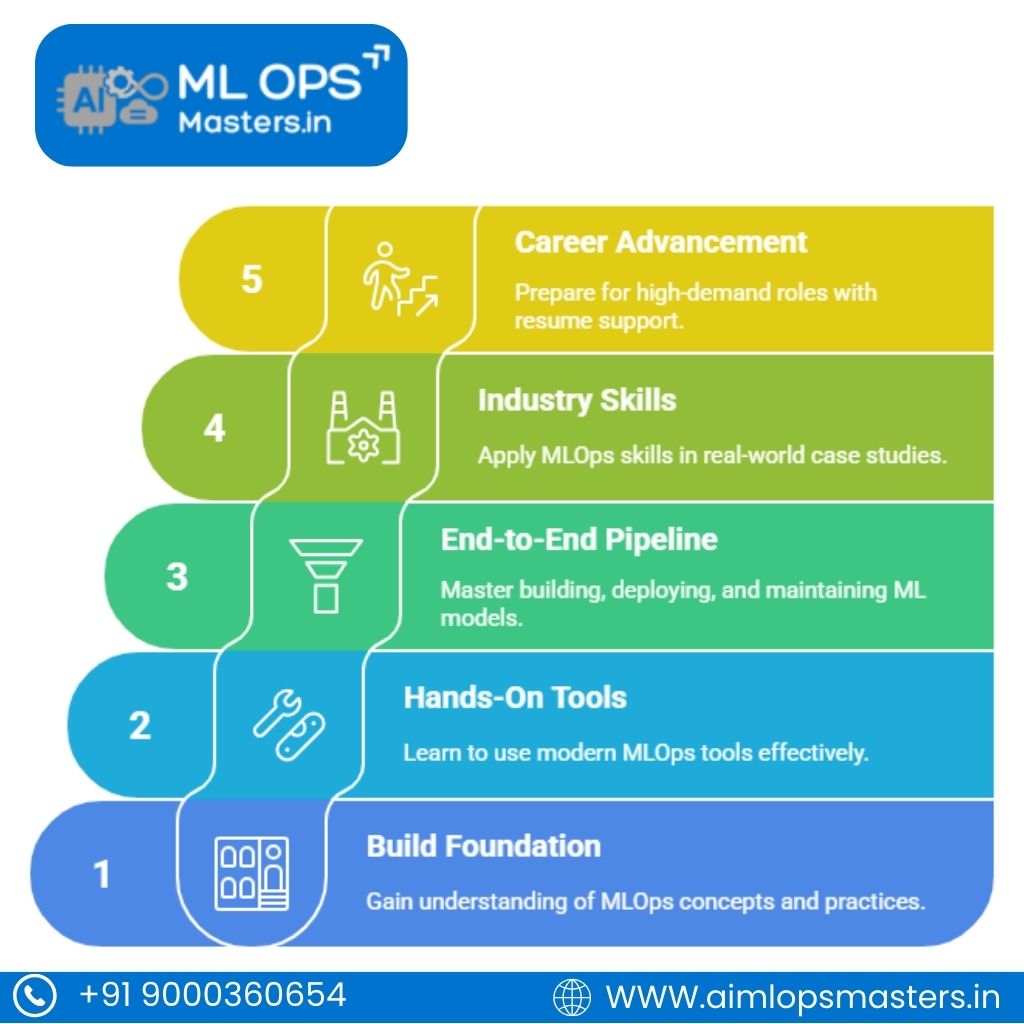
- Gain a clear understanding of MLOps concepts, lifecycle stages, and industry practices that help you manage machine learning projects effectively.
- Learn to work with modern MLOps tools like MLflow, Docker, Kubernetes, and cloud platforms through practical, real-time training.
- Master the process of building, deploying, monitoring, and maintaining machine learning models with automation and scalability.
- Get trained on Real case studies and projects, preparing you to apply MLOps skills directly in corporate environments.
- Prepare for high-demand roles such as MLOps Engineer and AI Specialist with resume support, interview practice, and placement guidance.
- Basic Knowledge of Machine Learning – A strong foundation in machine learning concepts such as supervised, unsupervised learning, and model evaluation is one of the important prerequisites of MLOps.
- Programming Skills – Good knowledge of programming languages like Python, R, or Java is a prerequisite of MLOps because most ML models and automation pipelines are built using these languages.
- Familiarity with DevOps Tools – Understanding version control (Git), CI/CD pipelines, and containerization tools like Docker and Kubernetes is a key prerequisite of MLOps.
- Cloud Platform Knowledge – Hands-on experience with cloud platforms such as AWS, Azure, or Google Cloud is considered a prerequisite of MLOps since deployment happens mostly in cloud environments.
- Mathematics and Statistics – A clear understanding of linear algebra, probability, and statistics is also a prerequisite of MLOps, as these concepts form the backbone of machine learning models.
Prerequisites of MLOPS
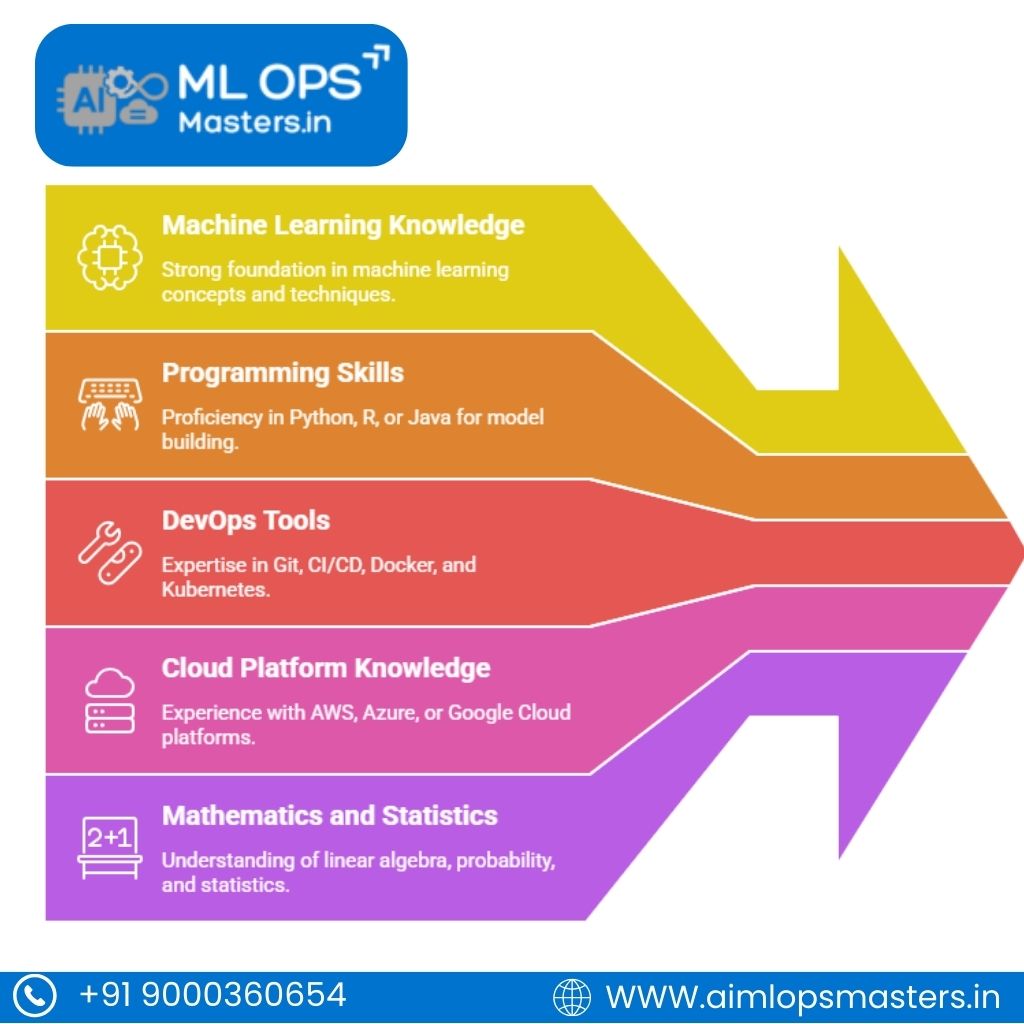
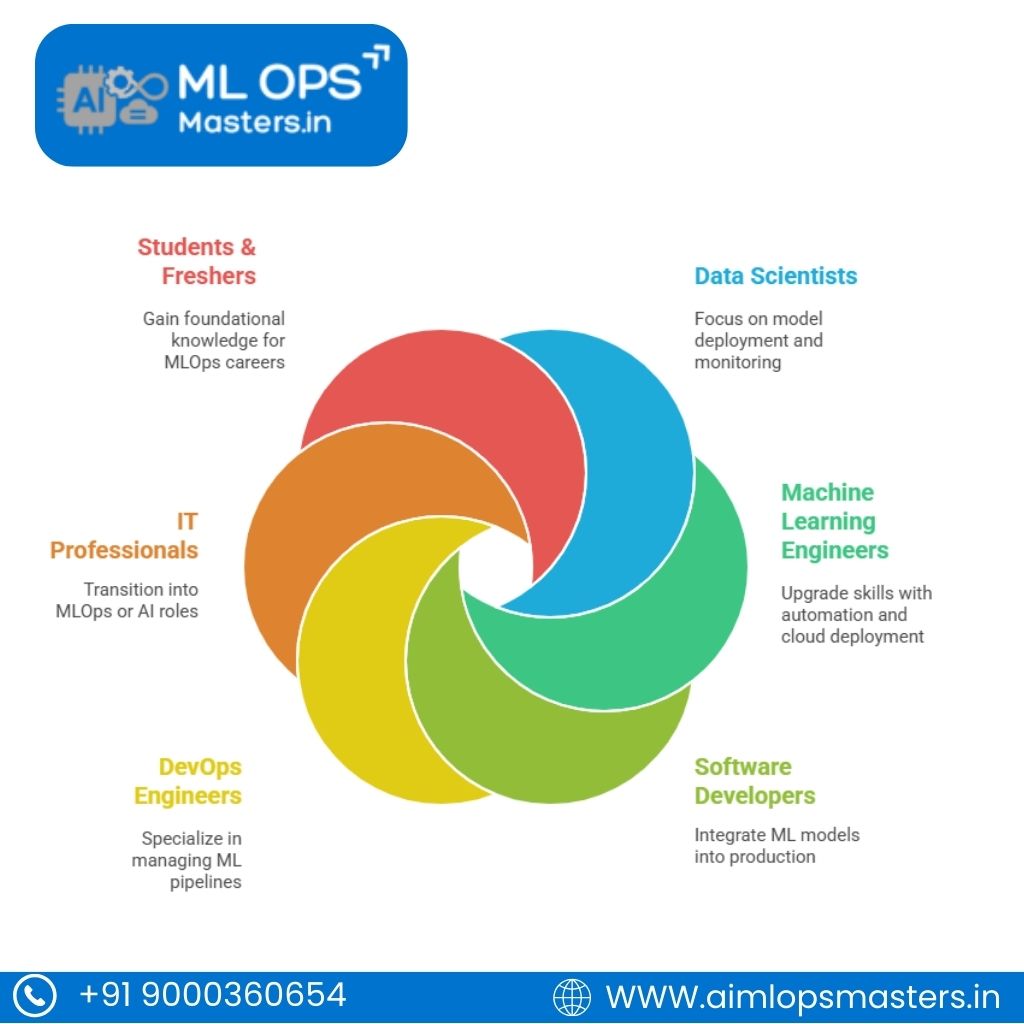
Who should learn MLOPS course
- Data Scientists – Data scientists who want to focus not just on model building but also on deployment, scaling, and monitoring in real projects will highly benefit from learning MLOps.
- Machine Learning Engineers – Machine learning engineers aiming to upgrade their ML knowledge with automation, CI/CD, and cloud deployment skills should join this course.
- Software Developers – Software developers interested in moving towards AI/ML applications and learning how to integrate ML models into production can gain strong expertise from MLOps.
- DevOps Engineers – DevOps engineers who already work with automation and cloud tools and now want to specialize in managing ML pipelines can strengthen their career with MLOps.
- IT Professionals – IT professionals who wish to transition into high-demand roles like MLOps Engineer or AI Engineer will find this course an ideal choice.
- Students & Freshers – Students and freshers from computer science, IT, or data science backgrounds aiming for career opportunities in MLOps will gain the right foundation.
MLOPS Training in Hyderabad
Course Outline
The MLOps course begins with an introduction to machine learning and operations, helping students understand how MLOps bridges the gap between data science and IT teams.
The training covers data collection, data preprocessing, and feature engineering so that learners gain skills in preparing clean and structured data for ML models.
Model development and experimentation are included, teaching students how to build, test, and optimize different machine learning models effectively.
Version control and reproducibility are also covered, ensuring models, code, and experiments are tracked properly for better collaboration.
Model deployment strategies are explained step by step, showing how to take machine learning models into real-time production systems.
Continuous integration and continuous deployment (CI/CD) practices are introduced, helping automate the end-to-end ML pipeline.
The program also trains students in monitoring and tracking model performance to detect errors, drifts, or accuracy issues after deployment.
Scaling machine learning models using cloud platforms, Docker, and Kubernetes is included to handle large-scale production systems.
Finally, learners work on projects and case studies to apply all the MLOps concepts in practical business scenarios.
Tools Covered

Git
Used to track and manage code changes, making it easy to collaborate and keep machine learning projects organised.
Docker
Used to package machine learning applications so they behave the same in development, testing, and production.

Kubernetes
Used to deploy, scale, and manage containerised machine learning applications automatically.

Jenkins
Used to automate building, testing, and deploying machine learning workflows through continuous integration and delivery.

MLflow
Used to track experiments, manage models, and streamline the deployment of machine learning projects.

Apache Airflow
Used to schedule, automate, and manage data and machine learning workflows efficiently.

Grafana
Used to visualize and monitor metrics from machine learning pipelines and infrastructure in real time.

PyTest
Used to write and run tests to ensure the quality and reliability of machine learning code.

HashiCorp
Used to securely store and manage secrets, credentials, and sensitive data for machine learning workflows.
MLOPS Course In Hyderabad
Modes
Classroom Training
- Daily Recorded Videos
- One - One Project Guidence
- Practical Application
- Get support till you are placed
- Mock Interviews
- Well-Organized Syllabus
Online Training
- Flexible Learning Schedule
- Recorded Video access
- Whatsapp Group Access
- Doubt Clearing Sessions
- Daily Session Recordings
Corporate Training
- Live Project Training
- On-site or Virtual Training Sessions
- Doubt Clearing Sessions
- Daily Class Recordings
- Team-building Activities
- Video Material Access
MLOPS Training In Hyderabad
Career Opportunities
01
MLOps Engineer
An MLOps Engineer focuses on building and maintaining automated ML pipelines. They handle deployment, monitoring, and scaling of models in production, ensuring faster delivery and stable performance.
02
Machine Learning Engineer
This role involves designing and developing ML models and making them production-ready. With MLOps skills, ML Engineers ensure that models are not just accurate but also reliable, scalable, and easy to deploy.
03
Data Scientist with MLOps Skills
Data Scientists who understand MLOps can take their models beyond experimentation. They are capable of deploying real-time models, monitoring performance, and aligning business outcomes with AI-driven insights.
04
AI/ML Solutions Architect
These professionals design complete AI systems, integrating cloud services, MLOps practices, and scalable infrastructure. They are responsible for choosing the right tools and ensuring smooth model lifecycle management.
05
DevOps Engineer (ML Focused)
A DevOps Engineer with MLOps knowledge bridges the gap between software operations and machine learning. They implement CI/CD pipelines tailored for ML workflows, improving collaboration between data and ops teams.
06
Research & Development Engineer
R&D Engineers explore new technologies and frameworks in MLOps. They experiment with advanced tools, optimize workflows, and contribute to innovation in AI/ML adoption across industries.
AI MLOPS Training Institute In Hyderabad
Skills Developed
Model Deployment Skills
Learners gain the ability to deploy machine learning models seamlessly into production environments using automation, CI/CD pipelines, and containerization tools like Docker and Kubernetes.
Data Pipeline Management
You will develop expertise in handling end-to-end data pipelines, from data collection and preprocessing to integration with ML models, ensuring smooth flow and accuracy in real-time scenarios.
Monitoring & Model Performance
MLOps training builds strong skills in monitoring model accuracy, drift, and reliability. You’ll learn to track performance using dashboards and retrain models when needed.
Cloud & Infrastructure Management
Learners acquire knowledge of cloud platforms such as AWS, Azure, and GCP, focusing on building scalable, secure, and cost-efficient ML workflows integrated with modern infrastructure.
Collaboration & Workflow Automation
The course trains you to work in cross-functional teams, automating workflows and bridging the gap between Data Scientists, DevOps Engineers, and Business Stakeholders.
Continuous Integration & Delivery (CI/CD) for ML
You will master the application of DevOps practices to ML, ensuring faster model delivery, version control, testing, and reliable updates in live environments.
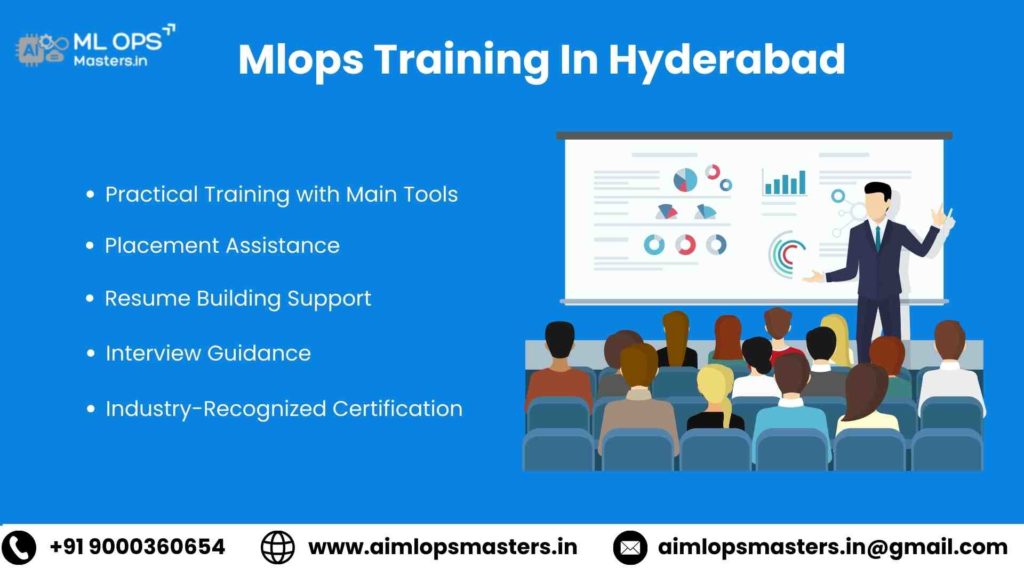
AI MLOPS Course Online Certifications
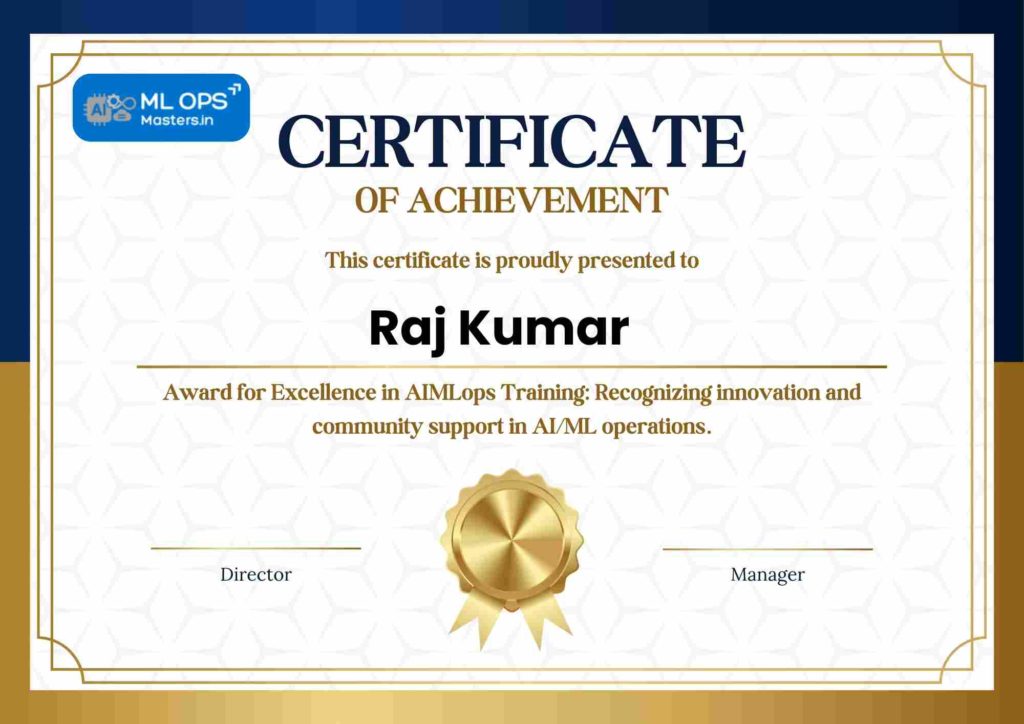
- The MLOps Certification proves your expertise in machine learning operations and is valued by top companies across industries
- With an MLOps Certification, you can apply for higher roles like MLOps Engineer, ML Engineer, or AI Specialist with better salary packages.
- This certification demonstrates your expertise in industry-standard tools such as Docker, Kubernetes, and CI/CD pipelines, which are essential in MLOps.
- Having an MLOps Certification gives you an advantage over non-certified candidates during interviews and promotions.
- Certified MLOps professionals can work across industries like IT, healthcare, finance, and e-commerce anywhere
Join AIMLOps and upskill with our industry-ready, how AIMLOps can boost your skills enroll in our AIOps Training Program to learn automation, monitoring, and AI in IT operations.
Companies that Hire From MLOPS Masters












MLOPs Training In Hyderabad
5000+ jobs Opening for MLOPs
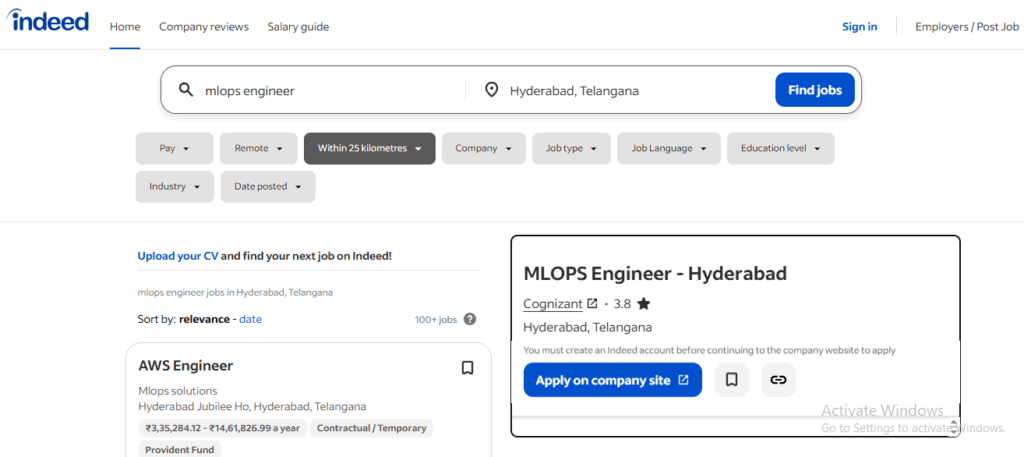
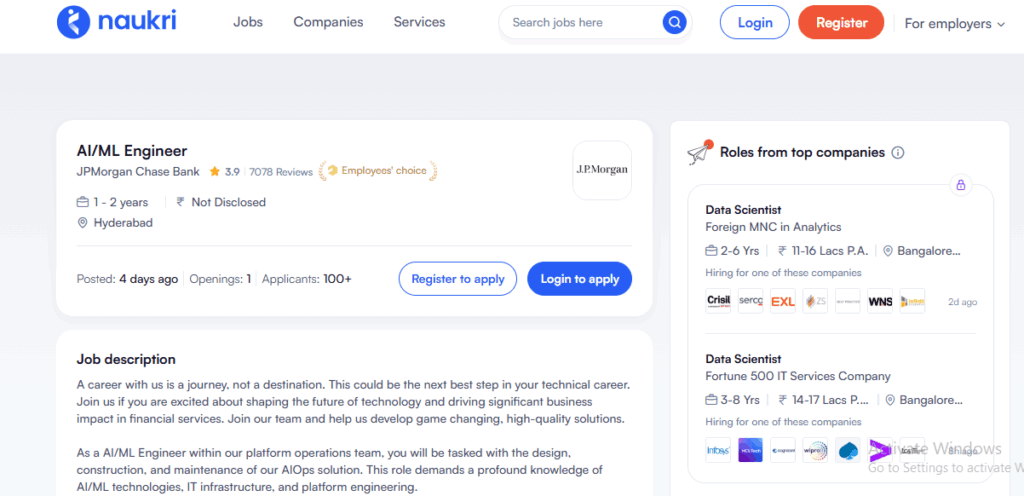
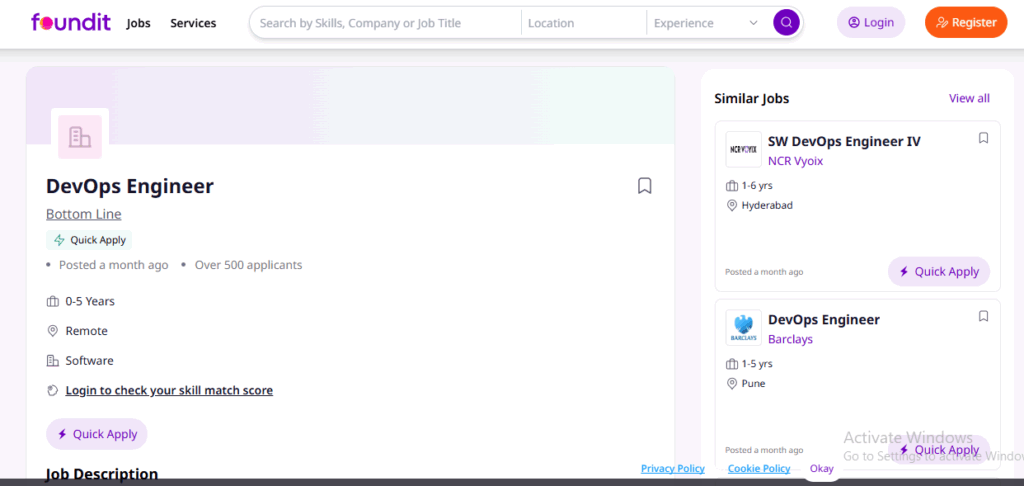
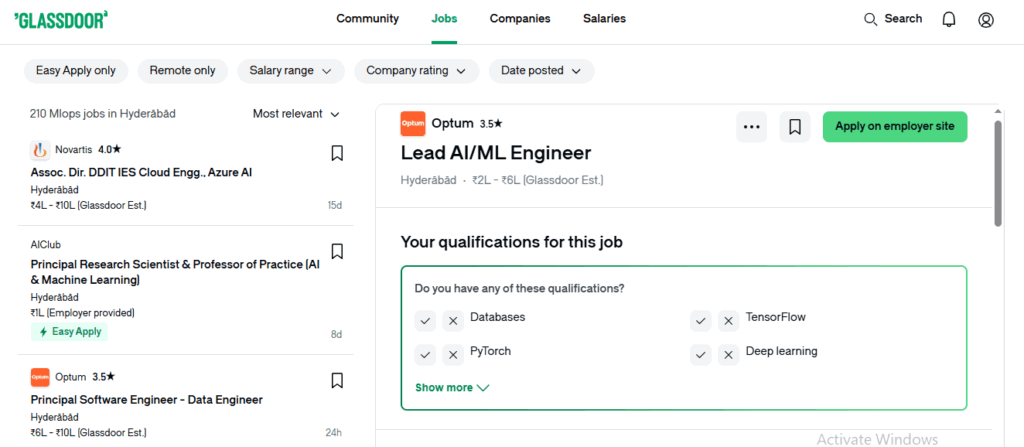
MLOPS Course In Hyderabad
Benefits
- High Career Demand
Completing an MLOps course makes you industry-ready for high-demand roles like MLOps Engineer, ML Architect, and AI Specialist.
- Better Salary Packages
MLOps professionals earn attractive salaries as companies are willing to pay more for experts who can manage AI/ML pipelines effectively.
- Hands-On Practical Skills
The course trains you in key tools such as Docker, Kubernetes, Git, and CI/CD pipelines, preparing you for practical challenges
- End-to-End Project Knowledge
You gain knowledge of the complete ML lifecycle, from model building to deployment, scaling, and monitoring in production.
- Industry Recognition
MLOps certification and training give you global recognition, proving your expertise and boosting your professional credibility.
- Flexible Career Opportunities
With MLOps skills, you can work across multiple industries such as IT, healthcare, banking, e-commerce, and research.
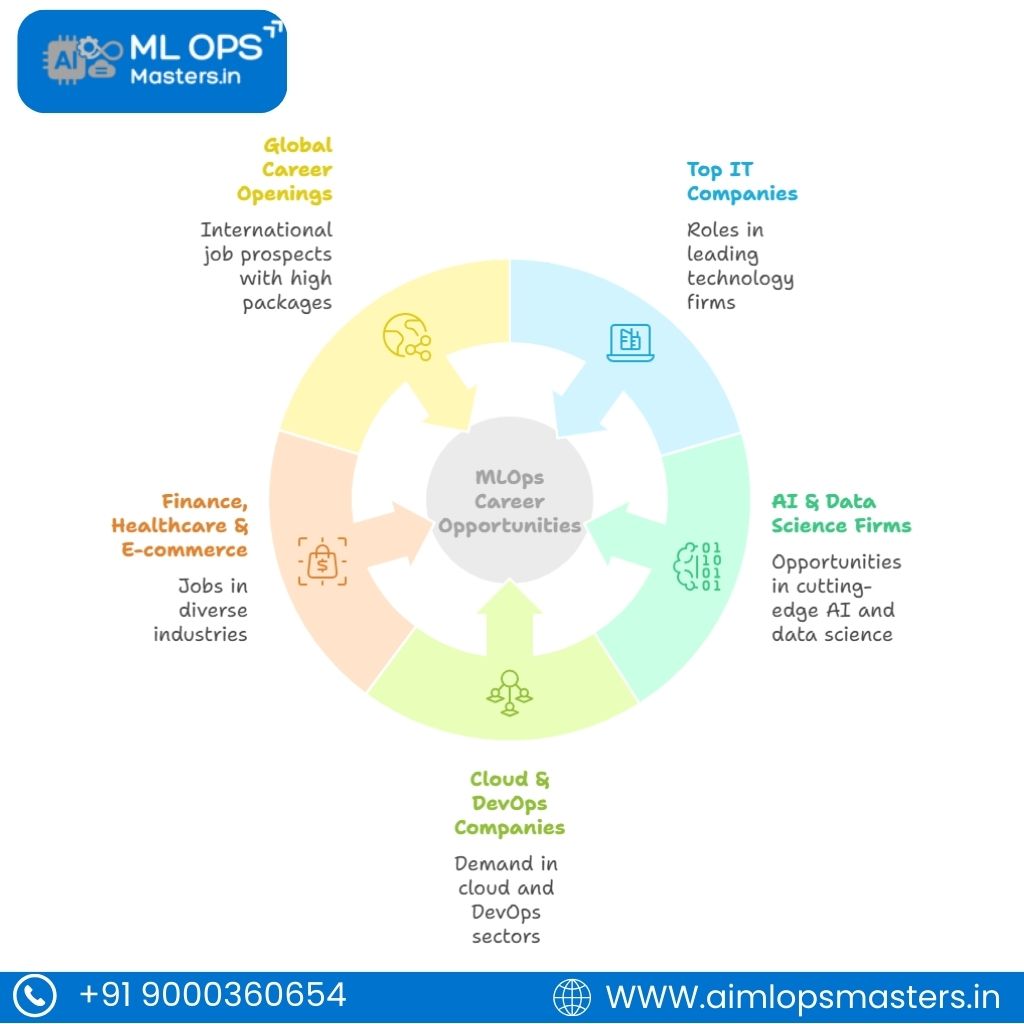
MLOPS Course
Placement Opportunities
- Roles in Top IT Companies
- Opportunities in AI & Data Science Firms
- Demand in Cloud & DevOps Companies
- Jobs in Finance, Healthcare & E-commerce
- Global Career Openings with High Packages
MLOPS Market Trend
Growing Adoption in Enterprises
More companies are adopting MLOps to manage machine learning workflows efficiently. From startups to large enterprises, the need for automation in AI projects is creating a steady rise in demand.
Increasing Cloud Integration
Cloud platforms like AWS, Azure, and GCP are heavily investing in MLOps solutions. This trend makes it easier for businesses to scale their AI models and integrate them into production.
Rising Demand for Automation
Organizations are shifting toward automation to reduce manual work in deploying, monitoring, and managing ML models. MLOps is becoming a key driver for faster and error-free processes.
High Market Growth Rate
Reports suggest that the global MLOps market is expected to grow at a strong CAGR. This growth highlights its importance in shaping the future of AI and machine learning adoption.
Expansion Across Industries
Beyond IT, industries like finance, healthcare, retail, and manufacturing are using MLOps. This cross-industry adoption is making it one of the most sought-after skill sets.
Investment in AI Startups
Venture capital funding is rapidly flowing into AI and MLOps-based startups. This shows how the market trend is supporting innovation and new business models.
Focus on Model Governance
As AI expands, there is a strong push for governance, compliance, and responsible AI. MLOps tools are being developed to ensure transparency, fairness, and accountability.
Growing Career Opportunities
The rising adoption of MLOps has created new roles like ML Engineers, MLOps Specialists, and AI DevOps Experts. This trend shows strong career growth for skilled professionals.
AI MLOPs Masters achievements
Testimonials
I’m a final-year B.Tech student, and this MLOps training in Hyderabad has been one of the best learning experiences of my degree. The trainers explained every concept clearly, from data preprocessing to model deployment. The hands-on labs made it easy to understand Docker, Kubernetes, and CI/CD, and now I feel fully prepared for campus placements.
Ramesh
As a postgraduate student in data science, I wanted a course that would give me practical skills. This MLOps training covered everything step by step, and the instructors were always ready to clarify doubts. The real projects gave me confidence to work on AI/ML pipelines independently.
Susmitha
Joining the MLOps training in Hyderabad turned out to be the best decision of my final semester. The mix of practical labs, small assignments, and supportive mentors helped me master tools like Docker and Kubernetes quickly.
Lavanya
This MLOps training in Hyderabad turned out to be the perfect choice for me as a student. The mix of theory and hands-on practice gave me clarity on cloud integration and monitoring. I’ve already started applying the skills in my academic projects.
Mounika
Joining the MLOps training in Hyderabad turned out to be the best decision of my final semester. The mix of practical labs, small assignments, and supportive mentors helped me master tools like Docker and Kubernetes quickly.
Manoj
Being new to DevOps and ML pipelines, I was nervous about joining. But the faculty explained everything in simple terms and gave plenty of practice assignments. Today I can confidently deploy models and manage automated workflows — a big step up for me as a student.
Vasu
Frequently Asked questions about MLOPS Tranining
FAQs
What is MLOps?
MLOps is the practice of managing the complete lifecycle of machine learning models, including building, deploying, monitoring, and updating them efficiently.
Why should I learn MLOps?
Learning MLOps gives you practical skills to handle AI projects end-to-end and makes you eligible for high-demand roles in the AI industry.
Who can join MLOps training?
Data scientists, ML engineers, software developers, IT professionals, and freshers with Python and ML knowledge can join MLOps courses.
What are the benefits of learning MLOps?
You gain hands-on skills, industry recognition, higher salary opportunities, end-to-end ML project knowledge, and career growth in AI.
What career roles are available after MLOps training?
Roles include MLOps Engineer, ML Engineer, AI DevOps Engineer, Data Scientist, and Cloud AI Specialist.
What is the average salary after completing MLOps?
In India, salaries range from ₹6 LPA to ₹20 LPA depending on experience, skills, and the hiring company.
How long is the MLOps course?
Most MLOps courses range from 2 to 6 months, depending on whether it’s online, classroom, or self-paced learning.
Can freshers learn MLOps?
Yes, freshers with basic Python, machine learning, and cloud knowledge can start learning MLOps and land good entry-level jobs.
What are the prerequisites for MLOps training?
Basic Python, machine learning fundamentals, cloud platform knowledge, and some understanding of DevOps concepts.
What tools will I learn in MLOps?
Popular tools include MLflow, Kubeflow, Docker, Kubernetes, TensorFlow, Git, and cloud platforms like AWS, Azure, and GCP.
Is coding required for MLOps?
Yes, coding in Python is essential for building models, automating pipelines, and deploying ML workflows.
What industries hire MLOps professionals?
IT, healthcare, finance, retail, e-commerce, and manufacturing industries are actively hiring MLOps experts.
How does MLOps help in real-time projects?
It ensures models are deployed efficiently, monitored continuously, and retrained automatically, making AI projects reliable.
Can I learn MLOps online?
Yes, online MLOps courses offer flexible timing, live projects, hands-on labs, and certification upon completion.
What certifications are available in MLOps?
Certifications include AWS ML, Azure Data Scientist Associate, Google Cloud ML Engineer, TensorFlow Developer, and Databricks ML Professional.
Does MLOps training include projects?
Yes, students work on real-time projects like building pipelines, deploying models, monitoring, and automation to gain practical experience.
What placement support is provided?
Training institutes offer resume preparation, mock interviews, and placement assistance to help students secure jobs in top companies.
Is MLOps difficult to learn?
It can be challenging initially, but practical training, projects, and mentorship make it manageable for beginners and professionals alike.
How long does it take to complete projects?
Projects typically take 2–4 weeks each, depending on complexity, giving hands-on experience in real ML scenarios.
What is the cost of MLOps courses?
Course fees vary based on duration, mode (online/classroom), and certification, generally ranging from ₹50,000 to ₹1,50,000.
Can MLOps skills help in freelancing?
Yes, certified MLOps professionals can work on freelance projects for ML automation, AI model deployment, and consulting.
Will I learn cloud deployment?
Yes, the course includes deploying ML models on AWS, Azure, and GCP, including scaling and monitoring in production.
How does MLOps improve employability?
Employers value MLOps skills as they bridge data science and operations, making professionals capable of handling end-to-end AI solutions.
Are there internship opportunities during the course?
Many institutes provide live internships or capstone projects to help students gain industry exposure.
How soon can I get a job after MLOps training?
With dedicated learning, practical projects, and certification, students can secure entry-level jobs within 1–3 months post-training.
Does MLOps require knowledge of DevOps?
Basic understanding of DevOps, CI/CD, and containerization helps, but comprehensive training is provided during the course.
Can non-technical students learn MLOps?
Students with some programming knowledge can learn, but technical background makes it easier to grasp pipelines and deployment concepts.
How is MLOps different from ML?
ML focuses on building models, while MLOps ensures these models are deployed, monitored, and maintained efficiently in production.
Are there global job opportunities in MLOps?
Yes, MLOps professionals are in demand globally, with opportunities in North America, Europe, Middle East, and Asia-Pacific regions.
Why should I invest in MLOps training?
It’s a future-ready skill, offers high salary potential, career growth, hands-on experience, and global recognition in AI and cloud industries.
